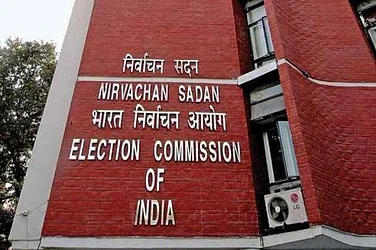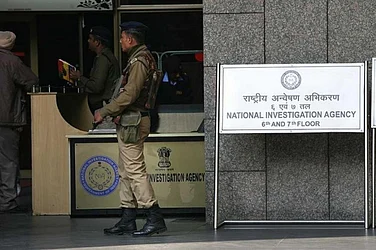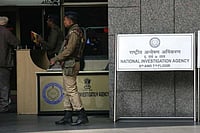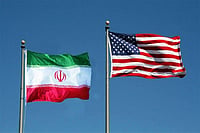Defence Minister Rajnath Singh on Thursday said India’s development march towards the north will be complete after reaching Gilgit and Baltistan, parts of Pakistan-occupied Kashmir. The minister made the statement in reference to the 1994 resolution passed in the Parliament on getting back the territories "under illegal occupation" of the neighbouring country.
Singh, who was addressing the Shaurya Diwas function in Srinagar to mark India’s first military victory after independence, also said that Pakistan is “committing atrocities” against people in its occupied Kashmir and will have to bear its consequences.
Asserting that discrimination against the people of Jammu and Kashmir ended under the leadership and guidance of Prime Minister Narendra Modi as Article 370 was abrogated, he said, “this brought a new dawn of hopes in the region.”
“Kashmir and Ladakh today are on an accelerated path of development. This region is touching new heights of development…We have only started our northward journey. Our journey will be complete when we fully implement the unanimous resolution passed by the Parliament on February 22, 1994, and we reach our remaining areas like Gilgit and Baltistan,” Singh said.
Where is Gilgit Baltistan?
The northernmost ‘illegal’’ territory administered by Pakistan, Gilgit-Baltistan or GB is the country's only territorial frontier, linking with China where it meets the Xinjiang Autonomous Region. On the west lies Afghanistan and Pakistan-occupied Kashmir on the south. To the east of GB is the Union Territory of Jammu and Kashmir.
GB became part of India when the former princely state of Jammu and Kashmir acceded to India after Independence. The territory, since then, has been under the illegal possession of Pakistan.
G-B’s political history and development
Part of former Jammu and Kashmir, Gilgit became part of India after the former Hindu ruler of J-K, Raja Hari Singh, signed the Instrument of Agreement on October 26, 1947. With the Agreement, Pakistan forces along with Pashtun tribal militiamen, who struck an attack on the J-K village on October 22, were forced out of the land by the Indian Army.
Gilgit, although, part of Singh’s territory, was directly ruled by the British, who had taken the land on leash from the King in 1935.
However, post Independence, there has been a politically tumultuous time in the region. On November 1, 1947, a rebellion had broken out against Hari Singh.
A local political outfit called the Revolutionary Council of Gilgit-Baltistan proclaimed the independent state of Gilgit-Baltistan and on November 15, the group declared its accession to Pakistan and the country agreed.
Pakistan agreed to administer the territory under the Frontier Crimes Regulation, a law set by the British to rule the restive tribals of the empire.
On January 1, 1949, India-Pakistan signed a ceasefire policy, following which, Pakistan entered into an agreement with the ‘provisional government’ of the ‘Azad Jammu and Kashmir’ in April. Through the agreement, the AJK government decided to cede the administration of G-B along with other parts of Pakistan.
The territory got its present name with the(Empowerment and Self-Governance) Order, 2009, which replaced the Northern Areas Legislative Council (NALC) with the Legislative Assembly.
G-B had its last polls in 2015. In November 2020, former Pakistan Prime Minister Imran Khan announced that G-B will get a “provisional provincial status”. However, the same is yet to happen.
What has been India’s take on the situation?
The Indian government on March 11, 2020, told Parliament that India’s “consistent and principled position, as also enunciated in the Parliament resolution adopted unanimously by both Houses on 22 February 1994, is that the entire Union Territories of Jammu & Kashmir and Ladakh have been, are and shall be an integral part of India”.
It said that the “Government monitors all developments taking place in the territories of India including in territories that are under illegal and forcible occupation of Pakistan.”
Prime Minister Modi also, in a rare departure from precedence, in his independence day speech in 2016 brought up the situation in Pakistan-occupied territories, and said the people of Balochistan and Gilgit thanked him for raising their issues.
Rajnath Singh, on Thursday, said Jan Sangh founder Syama Prasad Mookherjee had started a mahayajna for full integration of Jammu and Kashmir which was completed on August 5, 2019.
Referring to the atrocities committed by Pakistan against the people in PoK, the defence minister said the neighbouring country will have to “bear its consequences”.
“I would like to ask Pakistan about the rights given to the people living in our areas where it has maintained illegal occupation… We keep on hearing about the inhuman acts committed against innocent Indians for which Pakistan is fully responsible. And here I am talking about Pakistan-occupied Kashmir,” he added.
Accusing Pakistan of “shedding crocodile tears” in the name of human rights, Singh said, “the pain of the people of Pakistan-occupied-Kashmir also troubles us and not just them.”
“The tandav of terrorism that J&K has seen in the name of Kashmiriyat cannot be described,” he said while asserting that terrorism has no religion and the only aim of terrorists is to target India.
He claimed that in the last few years “some so-called intellectuals have cried human rights violations when actions were taken against terrorists”.
The Army hosted ‘Shaurya Diwas’ at the old airfield of Srinagar (Budgam airfield) to mark the 75th anniversary of the arrival of the 1 Sikh Regiment in 1947 to protect Jammu and Kashmir from Pakistani forces.
It was the first military operation of Independent India, a move that changed the course of the 1947-48 War.
The first of the Indian Army soldiers dispatched for the mission had landed at the airfield on October 27, 1947, to repulse Pakistani forces.
(with PTI inputs)


























